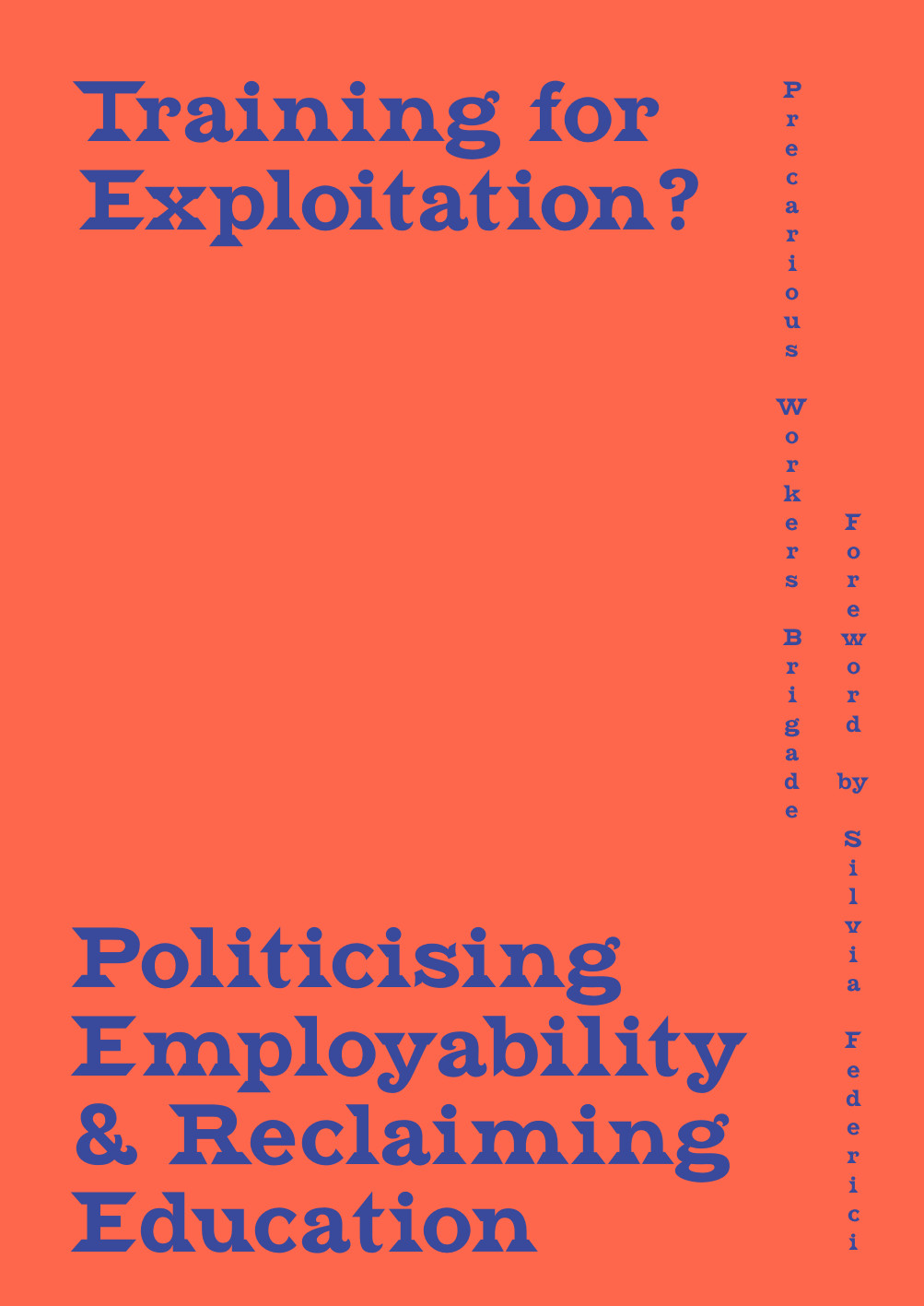Precarious Workers Brigade: Training for Exploitation: Politicising Employability and Reclaiming Education (2017)
Filed under book | Tags: · collaboration, education, employment, labour, precarity, work

“This publication provides a pedagogical framework that assists students and others in deconstructing dominant narratives around work, employability and careers, and explores alternative ways of engaging with work and the economy. Training for Exploitation? includes tools for critically examining the relationship between education, work and the cultural economy. It provides useful statistics and workshop exercises on topics such as precarity, employment rights, cooperation and solidarity, as well as examples of alternative educational and organising practices. Training for Exploitation? shows how we can both critique and organise against a system that is at the heart of the contemporary crises of work, student debt and precarity.”
Foreword by Silvia Federici
Publisher Journal of Aesthetics & Protest Press, London / Leipzig / Los Angeles, 2017
Creative Commons BY-NC-SA 4.0 International License
ISBN 9780615590110
95 pages
Trebor Scholz: Platform Cooperativism: Challenging the Corporate Sharing Economy (2016) [EN, DE]
Filed under brochure | Tags: · capitalism, collaboration, economics, internet, labour, platform cooperativism, sharing

“The “sharing economy” wasn’t supposed to be this way. Aided by the tiny computers most of us carry with us all day, every day, we would be free from the burdens of ownership and making money in our spare time by renting out our unused possessions. The vison was—or at least appeared to be—an idealistic one. Even before they enter kindergarten, every child learns the value of sharing, and here were the beneficent forces of Silicon Valley bringing us innovative new tools to strengthen our communities, disrupt outdated ways of doing business, and maybe even reduce our carbon footprints.
The reality turned out to be a little different. Sure, Uber and its ilk offer remarkable convenience and a nearly magical user experience, but their innovation lies just as much in evading regulations as in developing new technology. Behind the apps lies an army of contract workers without the protections offered to ordinary employees, much less the backing of a union. This new economy is not really about sharing at all. Rather, as Trebor Scholz argues in this study, it is an on-demand service economy that is spreading market relations deeper into our lives.
With these new middlemen sucking profits out of previously un-monetized interactions, creating new forms of hyper-exploitation, and spreading precarity throughout the workforce, what can we do? Scholz insists that we need not just resistance but a positive alternative. He calls this alternative “platform cooperativism,” which encompasses new ownership models for the Internet. Platform cooperativism insists that we’ll only be able to address the myriad ills of the sharing economy—that is to say platform capitalism—by changing ownership, establishing democratic governance, and reinvigorating solidarity. In this paper, Scholz breathes life into this idea by describing both actually existing and possible examples of platform co-ops, outlining basic principles for fairly operating labor platforms on the Internet, and suggesting next steps.”
Publisher Rosa Luxemburg Stiftung, New York Office, Jan 2016
27 pages
Platform Cooperativism (English, 2016, PDF, 6 MB)
Plattform-Kooperativismus (German, 2016, HTML, added on 2016-6-19)
Alexandre Leray, Stéphanie Vilayphiou (eds.): Considering Your Tools: A Reader for Designers and Developers (2013)
Filed under book | Tags: · collaboration, design, floss, free software, graphic design, interface, libre graphics, software, typography

“A teaching tool that makes the research accessible to design students and young professionals. This reader will provide them with accessible theory so that they can put the radical changes that are taking place in their profession, into perspective.”
“Today’s creation largely depends on digital tools. Far from being a neutral means to an artistic achievement, those tools are actually opinionated: they carry values and are full of conventions about the way things “ought” to be done. To us, a greater awareness of the role of digital tools is—if important to everybody—crucial in the education of artists and designers. Instead of means, the soft- and hardware tools can become partners to consciously think and converse with, to question and interrogate and to clash with. And because (visual) creation is so tightly coupled with technological development, a larger awareness of these tools can help one speculate about future practices and invent the tools to support them.
Contrary to other contemporary fields of creation, there is little literature on these questions in the sphere of graphic design. This is why we felt it was important to bring together texts and showcases on this topic into one comprehensive corpus: a tool to think about tools.
This publication contains newly commissioned, translated and re-issued texts, distributed over 5 chapters: Discrete Gestures is about how our body is informed by our digital tools; Reading Interfaces takes on different approaches to computer literacy; The Making of the Standards is about the social and technical processes behind the elaboration of norms; Myriadic Composition Tools tackles the question of software as a cultural object through the lens of digital typography; Finally, Shaping Processes discusses methodologies for open and critical collective practices. For each chapter, a short note problematize the questions behind the texts.”
With texts by Isabelle Stengers (0); Gerrit Noordzij, William A. Dwiggins, Evan Roth et al., Donald E. Knuth, Vilém Flusser, Friedrich A. Kittler, George Francis, Pierre Huyghebaert (1); Florian Cramer, Alexandre Leray and Stéphanie Vilayphiou, Olia Lialina, Lev Manovich (2); Denis Jacquerye, Unicode Inc., Anthony Froshaug, Open Source Publishing, Henri de Montrond, Martin Arnaud, Mark Pilgrim, Mailing list www-talk, Eric Schrijver (3); Maurice Girod, Robin Kinross, Femke Snelting and Alexandre Leray, Jacques André et al. (4); Christopher M. Kelty, Matthew Fuller, and Aitor Méndez (5).
Co-editors: Nicolas Malevé, Yvan Monroy Lopez, Lilly Nguyen, Camille Pageard, and Eric Schrijver
Publisher Libre Graphics Research Group, May 2013
Various licenses
For more on libre graphics, see Monoskop wiki.
Comment (0)
